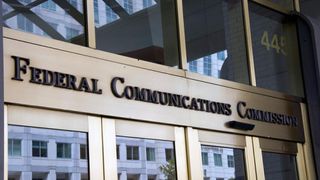Verizon: FCC Should Mandate Roughly Identical ATSC 1.0 Simulcasts

Verizon is pushing the FCC to require broadcasters to simulcast their TV station signal in ATSC 1.0 as they transition to the next-gen ATSC 3.0 transmission standard, and to broadcast the same programming (all of it) to the same general coverage area, in the same format and at the same bit rate.
That came in conversations this week between Verizon execs and the advisors to newly returned Commissioner Jessica Rosenworcel.
Broadcasters are looking for a tad more flexibility in how they roll out the new standard. The National Association of Broadcasters has told the FCC that "there is no need for Commission requirements concerning service area, programming format or programming content," including "any requirement that simulcasting stations be forced to carry identical content on both their ATSC 1.0 and Next Gen streams.
Related Article: Verizon Settles E-Rate Investigation for 17 Million
The FCC is expected to vote on a final order for rolling out ATSC 3.0 by year's end, which doesn't leave much time. It will publishing a tentative agenda for the Nov. 16 meeting on Oct. 26, so that would be a date to watch.
Verizon also says the FCC should not allow broadcasters to tie retransmission consent for current ATSC 1.0 broadcasts to carriage of a new, ATSC 3.0 signal. If that were allowed, Verizon says, it might have to drop some programming services given bandwidth constraints.
While the FCC could look at the issue of linking ATS 1.0 to ATSC 3.0 signals on a case-by-case basis under its totality of circumstances test for good faith retrans bargaining, Verizon says it would be better just to have a rule against conditioning carriage of ATSC 1.0 on carriage of 3.0.
NAB has told the FCC to reject what it calls MVPD's regulatory arbitrage. "Any lawyer who has ever negotiated a contract knows that a party can ask for anything it wants," it told the FCC in reply comments earlier this year, "but that does not mean it will get it. For example, it is impossible to take seriously Verizon’s portrayal that a local broadcaster can “compel carriage of ATSC 3.0 signals before consumer demand and market circumstances warrant. Verizon is not a helpless victim, it is one of the largest telecommunications service providers in the world."
Broadcasting & Cable Newsletter
The smarter way to stay on top of broadcasting and cable industry. Sign up below
The Verizon execs had one more ask: If the FCC allows LPTVs to flash cut to ATSC 3.0 (without simulcasting 1.0), MVPDs should be able to downconvert the signal.
National Association of Broadcasters President Gordon Smith met with Rosenworcel earlier this month to make the point that it was time for the FCC to approve the ATSC 3.0 order.
Contributing editor John Eggerton has been an editor and/or writer on media regulation, legislation and policy for over four decades, including covering the FCC, FTC, Congress, the major media trade associations, and the federal courts. In addition to Multichannel News and Broadcasting + Cable, his work has appeared in Radio World, TV Technology, TV Fax, This Week in Consumer Electronics, Variety and the Encyclopedia Britannica.

